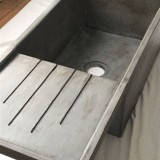Essential Aspects of Farm Sink Installation
Farm sinks, with their generous dimensions and rustic charm, have become a popular choice for kitchens of all sizes and styles. However, installing a farm sink is not a DIY project for beginners. The process requires careful planning and professional expertise to ensure a leak-free, durable installation. Here are some essential aspects to consider when undertaking farm sink installation:
1. Sink Selection and Placement: The size and shape of the farm sink should complement the kitchen layout and available counter space. Proper placement is crucial to allow for adequate clearance around the sink and faucets. It's recommended to consult with a kitchen designer or experienced plumber to determine the optimal location.
2. Countertop Modification: Farm sinks require specific modifications to the countertop. A hole must be cut to accommodate the sink's apron front, which sits flush with the countertop's edge. Cutting the countertop requires specialized tools and precision to ensure a clean and watertight fit.
3. Plumbing Connections: Connecting the farm sink to the plumbing system involves installing water supply lines and a drain. The water supply lines should be of sufficient size to provide adequate water flow, and the drain line should be properly sloped to prevent clogging. It's essential to use durable materials and follow plumbing codes to ensure a safe and leak-free installation.
4. Mounting and Sealing: Mounting a farm sink securely requires proper support. The sink is typically mounted on a sturdy base or frame that is anchored to the cabinet. To prevent leaks, a sealant is applied to the rim of the sink and around the perimeter of the countertop cutout. The sealant creates a watertight barrier, ensuring the longevity of the installation.
5. Faucet Installation: The choice of faucet is another important consideration. Farm sinks typically require high-arc faucets to accommodate the sink's deep basin. The faucet should be mounted directly on the sink or on a separate escutcheon plate. Proper tightening and sealing are necessary to prevent leaks and ensure optimal water flow.
Installing a farm sink requires a combination of precision, expertise, and attention to detail. It's highly recommended to seek the services of a qualified plumber who has experience with farm sink installations. By following these essential aspects, you can ensure a seamless, durable, and leak-free farm sink that will enhance the functionality and aesthetics of your kitchen for years to come.

The Ultimate Farmhouse Sink Installation Guide Boutique

How To Install A Farmhouse Sink

Fireclay Farmhouse Kitchen Sink Installation Guide

Farmhouse Sink Installation Easy Diy Top Mount Do Dodson Designs

Farm Sink Installation Tutorial Atticmag

Fireclay Farmhouse Kitchen Sink Installation Guide

Retrofit Installation Vault Farmhouse Stainless Steel Sink

Farmhouse Sink Installation Easy Diy Top Mount Do Dodson Designs

Kitchen Progress Installing The Farmhouse Sink Sarah Joy Style Cabinet Styles

How To Install A Farmhouse Sink Diy Kitchen Remodel








